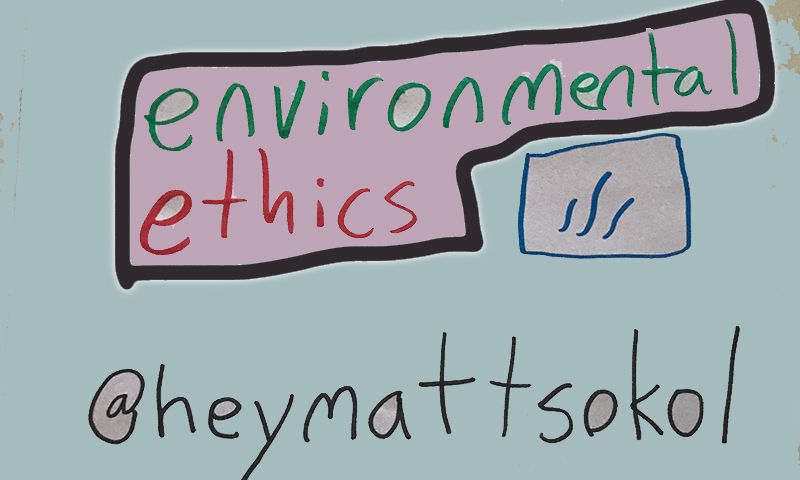The Easiest Way to Be Environmentally Ethical, Supercharged By Steem

Living your personal life in an environmentally friendly manner is necessary to live an ethically sound life. For many of us it also feels impossible.
You can debate the small things you do all day - driving vs. biking, how much garbage you produce, the kinds of farming practices you encourage with the food you buy — yet there’s never a good answer.
It’s not a matter of laziness or apathy. I’m the kind of person who tends to care about “doing good” in a general sense, even if nobody is looking. This is actually a part of the Jewish ideology and one thing that, above all else, sticks to my mind from when I grew up and learned in Sunday School (i.e. religious classes at the synagogue)
The Talmud lays it out, and JewFAQ summarizes from worst (1) to best (8):

from JewFAQ.com
Basically the more of a chill person you are, the better it is. Anonymity is considered better than taking credit. (I disagree with the idea that “not knowing the recipient” is always better - some level of verification is good to ensure your funds are used well)
The main point is that I was raised to believe that you should strive to do good before being asked, and without seeking too much credit.
Environmental Ethics: How Can It Be Easy?
If I’m going to be more environmentally sound, it has to be kind of easy. Let you who is without sin cast the first stone here, b/c I for one will not succeed at environmentalism if it’s really hard. If I have to spend significantly more time cooking, cleaning, etc, or spend way more money on my life, I’m likely to fall off of the habit.
More importantly than effort or money is the factor of knowing what is right. If every decision is vague (i.e. how to travel, eat, dress, and live) then I can’t win. If multiple groups loudly declare opposite values to be correct, IDK what to do.
Luckily there is a simple concept that I come across which makes it easy: Carbon neutrality. Anybody can calculate their environmental impact as their carbon footprint.
You see this concept all around the web and from all around the political spectrum. A few examples:
The bigger your carbon footprint, the more you need to contribute to offset your footprint. Some people might feel weird about this, but if you donate enough to plant a certain number of trees (somewhere around 20-30 per year), that repairs the ecosystem equal to the damage you do.
It’s like going to the doctor once a year rather than trying to stay in absolute perfect health. Or like planning to replace your clothes as they get old, rather than trying to keep the same shirts forever.
If you aren’t going to dedicate half of your waking hours to being environmentally friendly, carbon neutrality is probably the next best thing.
What Are The Flaws of Carbon Neutrality?
Most of the articles I see that criticize this concept date back to 2011 or earlier. This might mean that the opposition has fizzled out, signaling that the idea has gained mainstream acceptance.
For example in his book Doing Good Better, philosopher Will McAskill sums up a few criticisms of this idea:
- That it’s akin to “selling indulgences”
- The “Carbon Offset” methods could be flawed
- It’s better to focus on doing good by buying local, being careful
Will goes on to say these criticisms have not held up. He points out that the idea of indulgences doesn’t make sense if there is no damage at the end of the process. In other words, if the carbon offset is successful, it’s a net neutral. This is unlike buying “forgiveness” for adultery or violence.
The idea that the carbon offset methods could be flawed is a valid concern, but not a reason to avoid this method. It means that due diligence is needed to make sure the methods work.
And with regard to local food and transportation, the book claims that transportation accounts for only 10% of environmental impact relating to food. The rest is farming and other parts of the production line. If that’s true, it suggests that buying carbon offset credits is more effective than trying to shop local.
One salient quote from the book: “Plastic bags have also been a major focus of concern, but even on very generous estimates, if you stopped using plastic bags entirely, you’d cut out one hundred kilograms CO2 per year, which is only 0.4% of your total emissions.” (page 135)
I won’t put any effort into a 0.4% reduction. It isn’t enough. I want to do better than that and my “bandwidth” is very limited.
How Much Does It Cost to Become Carbon Neutral?
I want to save some room for another article or two on this topic. It’s so much information to take in that we shouldn’t go into the exact numbers and calculations yet.
At a glance, the number will be around $100 to $200 for those who live within a first world country like myself. I will do another post to calculate the numbers and show you how it works.
With that said here’s a calculator
Supercharged By Steem
How does Steem play into this? There are many ways that Steem can enable one to become carbon neutral.
METHOD 1
Simply make posts that ask for upvotes to fund your carbon neutrality. You could do a once-per-week “Carbon Neutrality Fund” series, save all the rewards in your Steem wallet somewhere, and then when you have enough, make your donation.
METHOD 2
There could be a new interface that automates carbon neutrality. You would log in via SteemConnect, then do a survey that calculates your carbon footprint for the previous year. After that it would automatically dedicate one 100% upvote per day to a post that pays out into carbon credits.
Once you’ve done enough upvotes to offset your previous year, you receive a “badge” to show off your carbon neutral status and it stops upvoting until next year. Wouldn’t this be sick?
METHOD 3
Do a one week power down every January. Use that money to become environmentally sound and make other charitable donations. It doesn’t even have to be a 100% power down if you can do a smaller amount and still cover your charitable needs.
Using Steem to Do Good Better
The charitable aspect of Steem has to be one of the most exciting. When people are able to freely be a micro-patron of any charity on any given day, amazing things will happen. We aren’t all the way there yet, but we’re getting close
I hope this post gave you some insight on how Steem can enable you to become environmentally ethical without working too hard at it.
Feel free to share your thoughts about all this in the comments.
Follow me on Instagram
Join the Mailing List, 2-3 emails per month

Gasoline prices going up might help some conservation. Trucks sure are popular though. I try not to waste energy.
That might force people to drive less, I hope thats not the only way we can be more environmental is by getting prices raised on us :-P. Might be better than nothing though if the world is at stake
Humans seem to always be wasteful. We wast food money energy and time.
You might want to sign up for @dustsweeper. FYI
no im not interested in dustsweeper
I am a proponent of all forms of sustainability, but I also like to encourage people to consider a selfish approach, meaning that there are all sorts of things one can do to save money while making a better environmental choice. In the US (as well as other places) solar continues to be a total "no-brainer" for anyone who is mindful of their own finances and plans to live in a home they own for more than 5 years. As electric cars become less expensive you can add them to that equation. I just read an article today that talked about how one can save money by committing to no buying products that are packaged in plastic. There will always be a segment of the population that does such things because they are conscious of their footprint, and have made a relative commitment to their own impact, but I truly believe that to get larger, critical mass of people to participate we have to push for ways of helping them see that there are also self serving (usually meaning financial) reasons to do these things.
Hopefully one day electric cars will be as affordable as gas cars then things will change real fast
I think its right around the corner. I see the big shift coinciding with subscription car programs.
I'm sorry I've resteem your post .. and allow me to resteem your post ... I like your post .. hence I want to resteem .. thank you for sharing ...